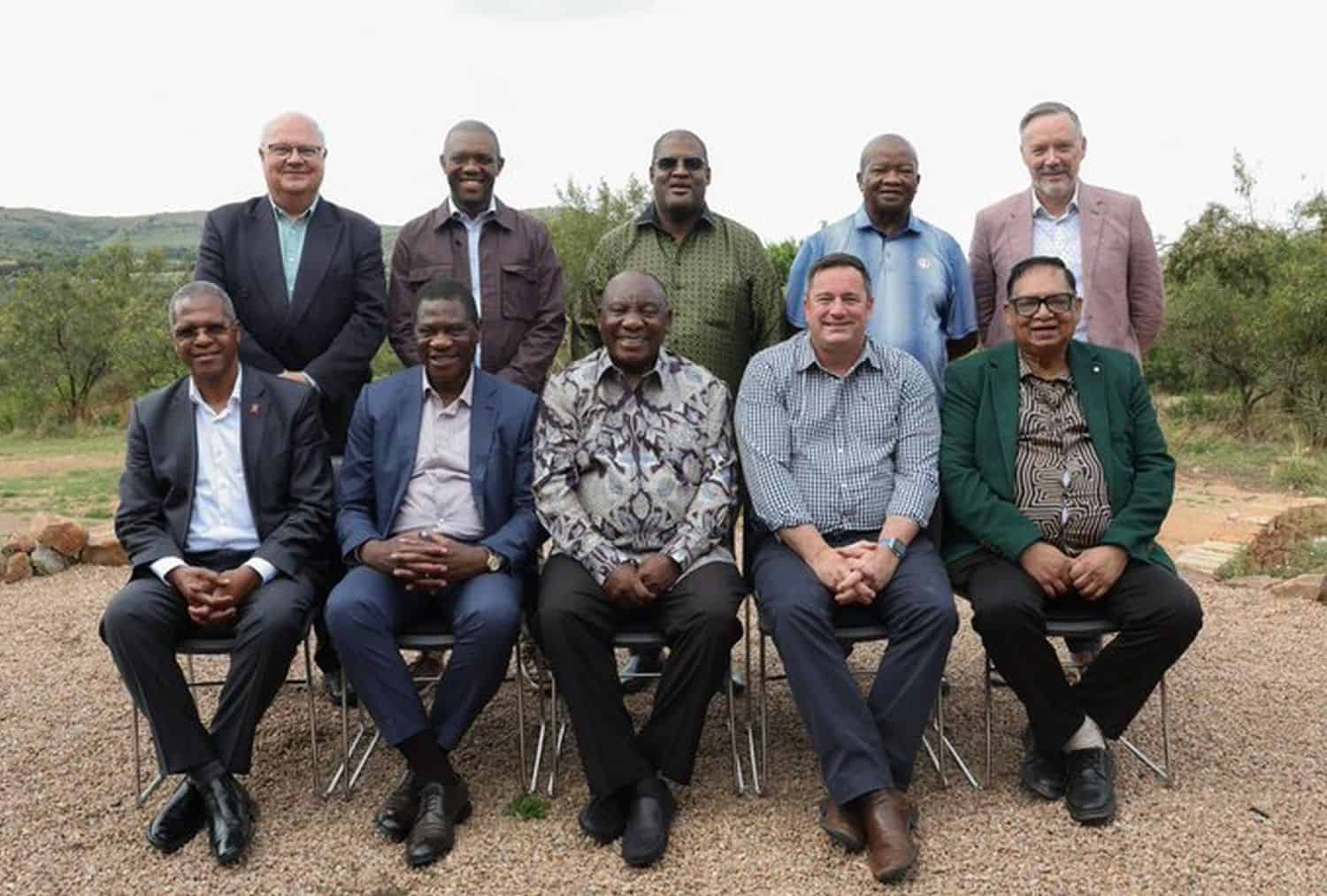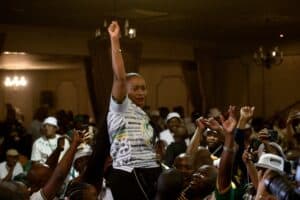Ramaphosa is said to have called the meeting to urge the GNU leaders to work together to rescue the country's struggling municipalities

The leaders of the 10 parties that form the government of national unity (GNU) met on Monday at the Cradle of Humankind in Gauteng and declared that the coalition is “united and strong”.
In a statement, the leaders of the parties listed achievements that they’ve made since the GNU was formed almost a year-and-a-half ago, but also highlighted areas that need improvement.
Achievements and work that still needs to be done
They agreed that some of the GNU’s work needs to be “accelerated”.
This includes greater urgency in the implementation and streamlining of government programmes, developing a plan to address the hunger affecting many South African households, intensifying the fight against gangsterism and organised crime, the appointment of capable and ethical leadership in the criminal justice system, dealing with illegal immigration, and improving the intervention of national and provincial government in struggling municipalities.
They listed the following as achievements since the GNU was formed:
- Establishing a platform for growth through reforms in energy, logistics, telecommunications, water and visas;
- Building more infrastructure and ramping up maintenance;
- Supporting poor households amid severe financial constraints;
- Pursuing a path to reduce the country’s debt burden;
- Rebuilding law enforcement agencies and other public institutions in the wake of state capture, while also getting South Africa removed from the FATF grey list;
- positioning the country as a meaningful player in international and regional peace and stability.
ALSO READ: ‘We must move beyond the statement of intent’ – Maimane on future of GNU
According to reports, President Cyril Ramaphosa called the meeting to urge the GNU leaders to work together to rescue the country’s struggling municipalities. The meeting also came as speculation grows that some within the ANC are unhappy with Ramaphosa’s leadership.
The meeting was attended by Ramaphosa, Deputy President Paul Mashatile (ANC), John Steenhuisen (DA), Velenkosini Hlabisa (IFP), Gayton McKenzie (PA), Corné Mulder (FF Plus), Bantu Holomisa (UDM), Songezo Zibi (Rise Mzansi), Ganief Hendricks (Al Jama-Ah), Mzwanele Nyhontso (PAC) and Brett Herron (Good).
Theo Neethling, a political analyst from the University of the Free State (UFS), said it is “encouraging” that the leaders of the parties within the GNU held the meeting.
“Such engagements have been far too rare,” he said. “Recently, John Steenhuisen expressed his dissatisfaction with the president’s tendency to exclude other GNU leaders from joint decision-making and planning.”
Is the GNU united?
Political analyst, Professor Drik Kotze from Unisa, said despite differences within the GNU, it is still the best option for South Africa.
“The only other option is a minority government of the ANC with 40%, which will be a very unstable and undesirable situation.
He said a coalition is non-negotiable and the ANC has three options. The first is for it to work with the DA, the second is to work with the MK party and the third is a coalition with the EFF and other smaller parties.
“Neither the MK party or the EFF are attractive to the ANC for many reasons. In the end, it’s really only the DA that is actually an option for them.”
ALSO READ: No party will pull out of the GNU, experts say
Neethling agreed that the current coalition is the best option for the country.
“The era of a dominant, all-powerful governing party is over. Coalition politics is now an established feature of South Africa’s political landscape, and the ANC has little choice but to govern in partnership with others. Ideally, the current GNU experience will lay the foundation for a new culture of collaboration in government and policymaking,” he said.
Kotze said the divisions in the GNU are mainly between the ANC and the DA.
“They are the two biggest parties, so that is where the real decisions are ultimately made.
“They are the core of the GNU, irrespective of how it is explained by the 10 parties.”
Kotze said that if you look at the scope of government’s work, there are relatively few contentious issues.
“I think the parties are working together; they are able to have a collegial relationship.
“It doesn’t mean they are always friends but that is how governments work – coalition governments especially.”
On Monday, the GNU leaders admitted that the Budget was a difficult time for the coalition government, but said they had learnt from it and that there would be more consultation in future on contentious issues.
Neethling said the Budget was a reminder to the ANC “that it can no longer disregard its GNU partners”.
“The ANC has learned a valuable political lesson in this regard.”
Kotze said that the contentious issues, such as the Bela Act, foreign policy and NHI, have helped the GNU to formulate a common position.
“They are formulating policies through these problematic issues… and though it’s not by design, it is a way they can resolve some of the important differences among them.”
Jobs and service delivery still problems
Kotze said the lack of load shedding, the improvement in the country’s railway system and the removal of South Africa from the FATF greylist are achievements the GNU can be proud of.
However, he said unemployment, service delivery and international relations are still major thorns in the GNU’s side.
“It’s a mixed bag, so we can’t, after 16 months, come to a conclusion about the success or failure of the GNU.”
Neethling said although there are positive elements since the GNU was formed, “economic growth and unemployment remain serious challenges”.
Despite this, he said the GNU is not on the brink of collapse.
“It would be unrealistic to expect the GNU to resolve all the country’s problems overnight. Rather, it should be seen as the beginning of a broader base for cooperation that could strengthen future governance and decision-making.”
READ NEXT: Ramaphosa walks as the DA wobbles






